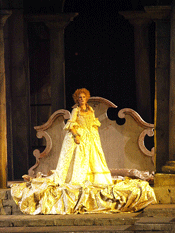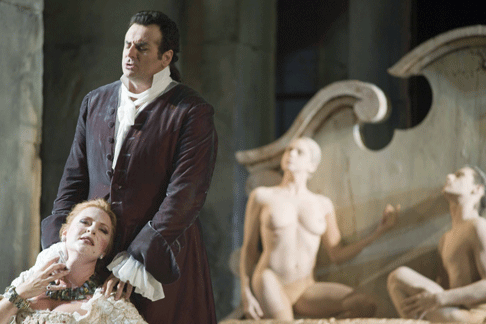Recently in Reviews
English Touring Opera are delighted to announce a season of lyric monodramas to tour nationally from October to December. The season features music for solo singer and piano by Argento, Britten, Tippett and Shostakovich with a bold and inventive approach to making opera during social distancing.
This tenth of ten Live from London concerts was in fact a recorded live performance from California. It was no less enjoyable for that, and it was also uplifting to learn that this wasn’t in fact the ‘last’ LfL event that we will be able to enjoy, courtesy of VOCES8 and their fellow vocal ensembles (more below …).
Ever since Wigmore Hall announced their superb series of autumn concerts, all streamed live and available free of charge, I’d been looking forward to this song recital by Ian Bostridge and Imogen Cooper.
The Sixteen continues its exploration of Henry Purcell’s Welcome Songs for Charles II. As with Robert King’s pioneering Purcell series begun over thirty years ago for Hyperion, Harry Christophers is recording two Welcome Songs per disc.
Although Stile Antico’s programme article for their Live from London recital introduced their selection from the many treasures of the English Renaissance in the context of the theological debates and upheavals of the Tudor and Elizabethan years, their performance was more evocative of private chamber music than of public liturgy.
In February this year, Albanian soprano Ermonela Jaho made a highly lauded debut recital at Wigmore Hall - a concert which both celebrated Opera Rara’s 50th anniversary and honoured the career of the Italian soprano Rosina Storchio (1872-1945), the star of verismo who created the title roles in Leoncavallo’s La bohème and Zazà, Mascagni’s Lodoletta and Puccini’s Madama Butterfly.
Evidently, face masks don’t stifle appreciative “Bravo!”s. And, reducing audience numbers doesn’t lower the volume of such acclamations. For, the audience at Wigmore Hall gave soprano Elizabeth Llewellyn and pianist Simon Lepper a greatly deserved warm reception and hearty response following this lunchtime recital of late-Romantic song.
Collapsology. Or, perhaps we should use the French word ‘Collapsologie’ because this is a transdisciplinary idea pretty much advocated by a series of French theorists - and apparently, mostly French theorists. It in essence focuses on the imminent collapse of modern society and all its layers - a series of escalating crises on a global scale: environmental, economic, geopolitical, governmental; the list is extensive.
For this week’s Live from London vocal recital we moved from the home of VOCES8, St Anne and St Agnes in the City of London, to Kings Place, where The Sixteen - who have been associate artists at the venue for some time - presented a programme of music and words bound together by the theme of ‘reflection’.
'Such is your divine Disposation that both you excellently understand, and royally entertaine the Exercise of Musicke.’
Amongst an avalanche of new Mahler recordings appearing at the moment (Das Lied von der Erde seems to be the most favoured, with three) this 1991 Mahler Second from the 2nd Kassel MahlerFest is one of the more interesting releases.
‘And there was war in heaven: Michael and his angels fought against the dragon; and the dragon fought and his angels, And prevailed not; neither was their place found any more in heaven … that old serpent … Satan, which deceiveth the whole world: he was cast out into the earth, and his angels were cast out with him.’
If there is one myth, it seems believed by some people today, that probably needs shattering it is that post-war recordings or performances of Wagner operas were always of exceptional quality. This 1949 Hamburg Tristan und Isolde is one of those recordings - though quite who is to blame for its many problems takes quite some unearthing.
There was never any doubt that the fifth of the twelve Met Stars Live in Concert broadcasts was going to be a palpably intense and vivid event, as well as a musically stunning and theatrically enervating experience.
‘Love’ was the theme for this Live from London performance by Apollo5. Given the complexity and diversity of that human emotion, and Apollo5’s reputation for versatility and diverse repertoire, ranging from Renaissance choral music to jazz, from contemporary classical works to popular song, it was no surprise that their programme spanned 500 years and several musical styles.
The Academy of St Martin in the Fields have titled their autumn series of eight concerts - which are taking place at 5pm and 7.30pm on two Saturdays each month at their home venue in Trafalgar Square, and being filmed for streaming the following Thursday - ‘re:connect’.
The London Symphony Orchestra opened their Autumn 2020 season with a homage to Oliver Knussen, who died at the age of 66 in July 2018. The programme traced a national musical lineage through the twentieth century, from Britten to Knussen, on to Mark-Anthony Turnage, and entwining the LSO and Rattle too.
With the Live from London digital vocal festival entering the second half of the series, the festival’s host, VOCES8, returned to their home at St Annes and St Agnes in the City of London to present a sequence of ‘Choral Dances’ - vocal music inspired by dance, embracing diverse genres from the Renaissance madrigal to swing jazz.
Just a few unison string wriggles from the opening of Mozart’s overture to Le nozze di Figaro are enough to make any opera-lover perch on the edge of their seat, in excited anticipation of the drama in music to come, so there could be no other curtain-raiser for this Gala Concert at the Royal Opera House, the latest instalment from ‘their House’ to ‘our houses’.
"Before the ending of the day, creator of all things, we pray that, with your accustomed mercy, you may watch over us."
Reviews
![Martina Serafin as Manon and Marcello Giordani as des Grieux [Photo courtesy of Festival Puccini di Torre del Lago]](http://www.operatoday.com/Manon-Lescaut_TorredelLago0.gif)
30 Aug 2009
Manon Lescaut at the Festival Puccini di Torre del Lago
Each year, the tiny Tuscan village Torre del Lago hosts a festival dedicated to its favorite son, Giacomo Puccini. This year’s Puccini Festival (10 July - 30 August) featured a “new” Manon Lescaut (a co-production with Opera del Nice Theater), its premiere garnering standing ovations for Marcello Giordani and Martina Serafin and accolades for Alberto Veronesi, the artistic director of the Festival.
What set this production apart was the inclusion of a prelude to Act II that had been part of an earlier draft of the work, along with a scene of the two lovers living happily in Paris. Aside from being too similar to Massenet’s Manon (‘adieu à la petite table’), Puccini cut the scene to move directly from the lovers’ flight from Amiens to Geronte’s mansion where Manon, having abandoned the penniless des Grieux, luxuriated as Geronte’s mistress. The fully orchestrated prelude had gone unperformed until Chailly’s 1984 recording of rarely performed works (a recording that is currently difficult to find). With this production, Maestro Veronesi performed the prelude as an integral part of the entire work.
 Martina Serafin as Manon
Martina Serafin as Manon
A minuet in form, the prelude, rife with melancholy, evoked the flame of the lovers’ intense, but short-lived affair. More importantly, the prelude evidenced Puccini’s mastering of 20th century musical theater that incorporated Wagner’s rich symphonic approach and anticipated Janáček’s use of repetitive fragments (“interruption motifs”) and of his orchestration, often with programmatic origins, “capable of great sweetness [yet with] a roughness caused by the unblended layers of orchestra and by the seemingly unidiomatic writing in individual parts.” [John Tyrrell, “Janáček, Leoš [Leo Eugen],” Grove Music Online]
Guided by Maestro Veronesi, the Puccini Festival Orchestra has matured significantly over the past five years. In this production of Manon Lescaut, the orchestra traversed the difficult score masterfully, both in supporting the singers (à la Verdi) and in performing program music (such as the intermezzo between Act II and Act III) with aplomb. It was difficult, however, to appreciate all of the orchestra’s subtleties in the upper rows of the 3,500-seat open air auditorium.
Passion, even carnal passion, paradoxically devoid of erotic love and desire, inspired Verdian melodrama. Manon Lescaut, on the other hand, returned erotic expression as a central element of Italian opera. The erotic aspects of Manon Lescaut are expressed with increasing intensity by the two principals, Manon and des Grieux, from the youthful aria “Donna non vidi mai” (Act I), to the duet “Tu, tu amore tu” (Act II), to the aria “No! no!, pazzo son” (Act III), to the desperate “Sola, perduta, abbandonata” (Act IV). Marcello Giordani and Martina Serafin executed these roles with perfection. Giordani’s wide register and power filled the auditorium, recalling the finest of performances by Domingo in the mid-1980s. Serafin, mostly noted for her performances of Wagner and Strauss, added a Wagnerian touch to “Sola, perduta, abbandonata” that aligned well with Veronesi’s conducting, her performance of the role being closer to that of Renata Scotto rather than that of the more lyrical Mirella Freni. Comprimario roles — Lescaut (Giovanni Guagliardo), Edmondo (Cristian Olivieri), Geronte (Alessandro Guerzoni) — were adequate, yet overwhelmed by Giordani and Serafin.
 Martina Serafin as Manon and Marcello Giordani as des Grieux
Martina Serafin as Manon and Marcello Giordani as des Grieux
Significant weaknesses of this production arose from the contributions of Paul-Emile Fourny (director) and Poppi Ranchetti (sets). Little attention was paid to the singers’ acting . And the staging included a crowd of mimes (ostensibly naked) and dancers, the relevance of which remained unclear. The set transformed from a Renaissance ninfeo by Bramante (a 15th century architect) to a villa near Rome that deteriorated in appearance from one act to another (seemingly intended to mirror the degradation of Manon and des Grieux), all having a bewildering effect.
Giuseppe Pennisi
![Martina Serafin as Manon and Marcello Giordani as des Grieux [Photo courtesy of Festival Puccini di Torre del Lago]](http://www.operatoday.com/Manon-Lescaut_TorredelLago0.gif)

